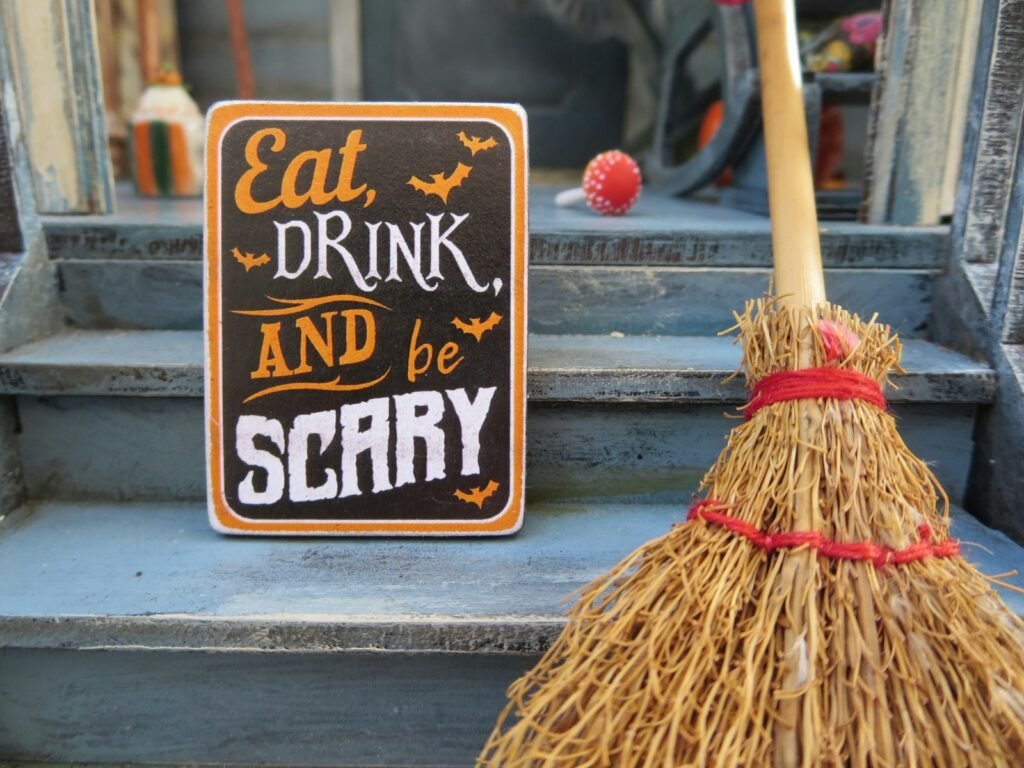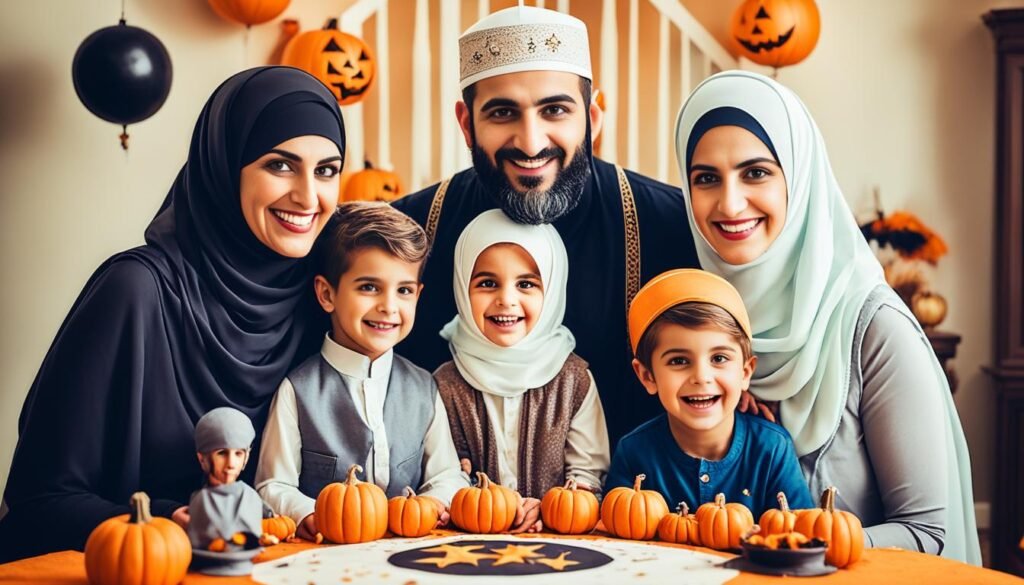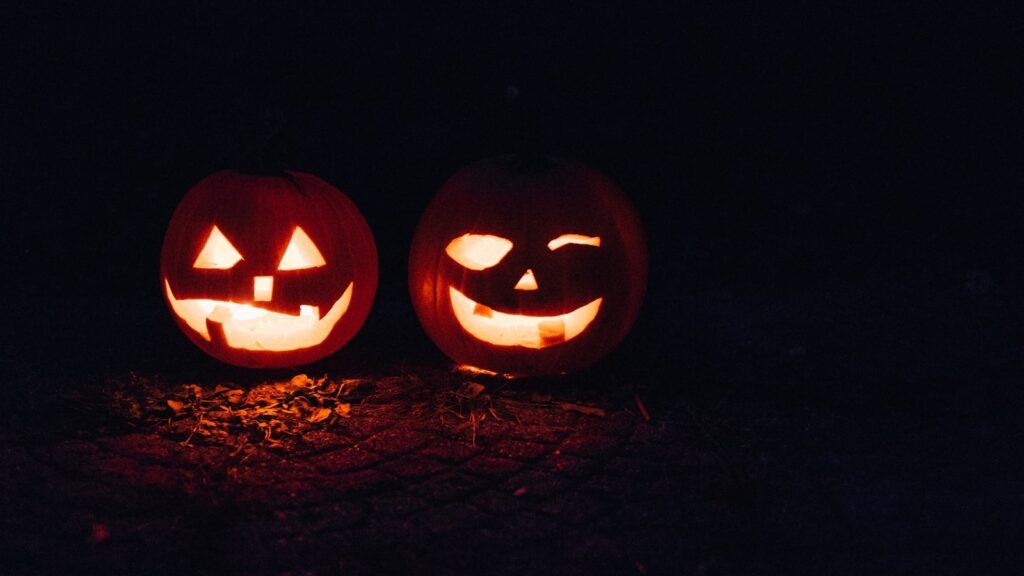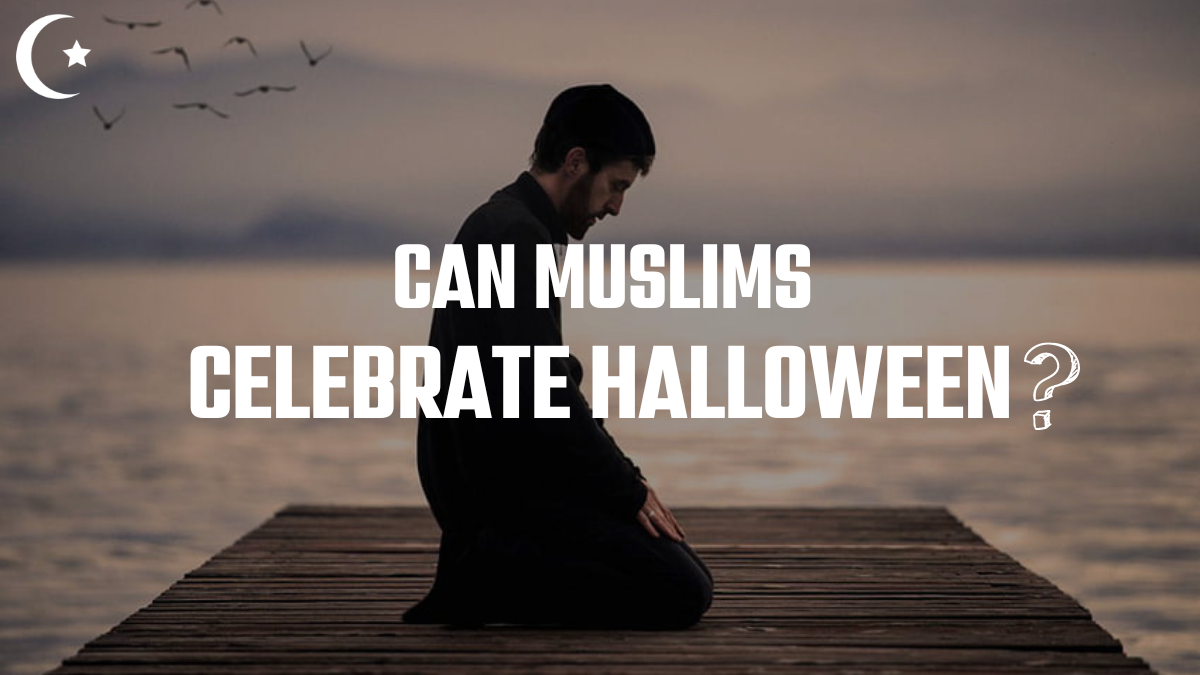Halloween is coming, and many wonder: Can Muslims join in a celebration filled with pagan traditions? In the U.S., kids look forward to trick-or-treating, with 99% choosing candy from stores. But for Muslim families, deciding to celebrate Halloween is tough. They worry about its spiritual impact.
This article will look into Halloween’s history, Islamic views on it, and what scholars say. It aims to help American Muslims make up their minds. They want to teach their kids a strong Muslim identity. But they also face the challenge of balancing this with Islamic values.
So, can Muslims celebrate Halloween? It’s not just about culture. It’s about their beliefs and what they teach their kids.

Understanding the Origins of Halloween
The story of Halloween goes way back to ancient Celtic traditions. It was a big festival on October 31, called Samhain. It marked the end of harvest and the start of winter. The Celts thought that on this day, the line between life and death got fuzzy, letting spirits come back.
To make peace with these spirits, they set up special rituals and customs.
Ancient Celtic Traditions
Samhain was a big deal in Celtic culture. It was filled with feasts, lighting fires, and other activities to keep away bad spirits. They used symbols and stories to connect with the spirit world. These celebrations helped them move into winter and think about life and death.
Halloween’s Pagan Roots
Halloween has deep roots in old pagan rituals from Samhain. The Druids, Celtic priests, saw it as a new year, marking changes in their farming calendar. Today, we still see parts of these old traditions in things like trick-or-treating and wearing costumes. These customs show our deep interest in the supernatural and the balance between life and death.
Halloween and Its Symbolism
Halloween is full of deep meanings, mixing spirituality with cultural traditions. It’s a time when people believe spirits from beyond come back. To keep these spirits friendly, people leave out treats, following an old custom.
This act shows a deep respect for ancient pagan rituals. It paints a clear picture of what Halloween means to many.
The Celebration of Spirits
The idea of spirits coming back is key to Halloween. It’s seen as a time when the line between life and death is thin. People honor the dead by leaving out treats, hoping to keep away negative spirits.
This tradition shows a deep respect for the supernatural. It’s a mix of reverence and caution.
Connection to Witchcraft and Demons
Witchcraft and demons are big parts of Halloween stories. Images of witches and devils are everywhere during this time. These images bring up spooky feelings that some find hard to accept.
Many Muslims see these images as against their beliefs. They worry about the holiday’s links to disbelief. This makes people think more about how Halloween affects their faith and actions.
What Do Islamic Teachings Say?
Islamic teachings give clear advice on joining in holidays and celebrations that go against the faith’s main beliefs. Taking part in non-Muslim traditions worries scholars and followers. Looking at Halloween, many of its practices go against key Islamic values.
Prohibition on Imitating Non-Muslim Traditions
Islamic teachings stress the need to keep a unique Muslim identity. Joining in Halloween, with its pagan customs, goes against this. Activities like trick-or-treating or wearing costumes linked to spirits are seen as supporting beliefs against Islamic values.
The Quran warns against following traditions that go against its teachings. It says Muslims should stay away from events like Halloween that don’t match their faith.
The Concept of Shirk in Islam
Shirk, or making partners with Allah, is seen as a major sin in Islam. Halloween practices, like worshipping spirits and witchcraft symbols, threaten the faith’s monotheistic beliefs. Taking part in Halloween might lead to actions that promote shirk, risking one’s spiritual purity.
Islamic teachings focus on remembering Allah and sticking to revealed truths. The ban on Halloween fits with avoiding actions that could weaken faith.
Can Muslims Celebrate Halloween
Many Islamic scholars and leaders have talked about whether Muslims can join in Halloween. They say this event comes from pagan beliefs and doesn’t fit with Muslim faith and traditions.
The Views of Islamic Scholars
Islamic scholars point out that Halloween has roots in paganism. They believe taking part in it takes away from Islamic values. Famous Islamic thinkers like Ibn Taymiyah say Muslims should not join in non-believers’ festivals. These festivals often lack any religious value. This view stresses the need to avoid traditions that go against Islamic teachings.
Risk of Associating with Pagan Beliefs

Being part of Halloween can lead to linking up with pagan beliefs and rituals. This link can make a Muslim feel disconnected from their faith. Celebrating witches, demons, or magic goes against Islamic beliefs. So, Muslims are told to skip Halloween and stick to their Islamic traditions, like the two Eid festivals.
Parental Guidance on Halloween
Parental guidance is key in helping kids keep a strong Muslim identity, especially on special days like Halloween. It’s important for parents to talk openly about their faith and how it affects their choices. When kids face pressure from others, parents can show them the value of their culture and faith.
Supporting Muslim Identity in Children
Parents help their kids feel proud of being Muslim by sharing stories from Islamic texts and the importance of their heritage. Learning about Halloween’s origins can help kids see why some traditions might not fit with Islamic values. Talking with them about these topics helps them understand and stick to their beliefs.
By suggesting other fun Islamic events, parents can help their kids feel secure in their faith. This way, they avoid harmful traditions. For more info, check out here.
Addressing Peer Pressure
Many Muslim kids face pressure from friends to join in on Halloween. Parents can fight this by teaching them about Halloween’s true meaning. This helps kids stand up for their beliefs without giving in.
Showing kids that their identity is special and respected helps them resist peer pressure. Making friends who share their beliefs can also make things easier. This creates a supportive circle where they can be themselves.
You may also be interested in:
Alternative Activities to Halloween
For families looking for ways to celebrate without Halloween, there are many options that fit Islamic values. Planning events that bring people together and encourage creativity helps shift focus away from Halloween. This way, families can enjoy positive occasions instead.
Creating Non-Halloween Themed Celebrations
Families can throw parties based on Islamic celebrations like Eid or cultural events. These parties focus on fun and togetherness, avoiding Halloween themes. They can include games, stories, and activities that make family bonds stronger. This creates a healthy environment for both kids and adults.
Costume and Candy Options Outside Halloween
Kids love dressing up and getting treats, but it doesn’t have to be for Halloween. Parents can plan costume parties with themes not related to the spooky season. This lets kids be creative. Giving out homemade treats or healthy snacks keeps the celebration in line with their values.

The Impact of Halloween on Muslim Character
Halloween is more than just costumes and candy. It’s linked to symbols like witches and demons, which can be harmful for Muslims. These symbols go against the values of Islam, focusing on virtue and righteousness.
Associating with Negative Symbols
Decorations for Halloween often reflect fear and darkness. This can harm a Muslim’s character. Taking part in these celebrations can make it hard to keep beliefs and actions in line.
Islam teaches us to focus on the One True God. Celebrating events that honor other supernatural beings goes against this. It’s important for Muslims to be careful about what they choose to do.
Educating Children About Halloween
In today’s world, Halloween is a big deal. It’s important for kids to learn about Islamic values. This learning should be more than just saying what’s not allowed. Parents should explain why some traditions are not good for Muslims.
They should talk about Halloween’s roots and how they clash with Islamic beliefs. This helps kids understand the reasons behind the rules.
Discussing the Significance of Islamic Values
Talking about Islamic values helps kids understand Halloween better. Parents can teach them to stand up for their beliefs in a world that might push them to fit in. They can show how Halloween’s fun is not as important as the values in the Qur’an.
These lessons help kids feel proud of their faith, even if they don’t join in Halloween. Knowing their beliefs are different makes them stronger. This way, they’re ready to handle challenges with their values clear in mind.
FAQ
Can Muslims Celebrate Halloween?
What are the historical roots of Halloween?
Why is Halloween considered a celebration of spirits?
What do Islamic teachings say about imitating non-Muslim traditions?
What does the concept of shirk mean in the context of Halloween?
What do Islamic scholars think about Muslims celebrating Halloween?
How does participation in Halloween affect Muslim beliefs?
How can parents support their children’s Muslim identity during Halloween?
What alternatives do families have instead of celebrating Halloween?
What negative symbols are associated with Halloween, and why are they concerning?
How can parents educate their children about Halloween?

Embracing Faith, One Insight at a Time!
The teachings of the Quran have always guided my path. With a deep passion for Islamic knowledge, I strive to blend the wisdom of tradition with the relevance of today, making the timeless messages of Islam accessible and meaningful for everyone.
Muslim Culture Hub is my platform to share historical insights and thought-provoking articles, exploring both well-known and lesser-discussed aspects of Islamic culture and beliefs. My mission is to create an inclusive online space where everyone can learn, strengthen their faith, and connect with the profound message of Islam.
Join the journey!
May peace be upon you.








